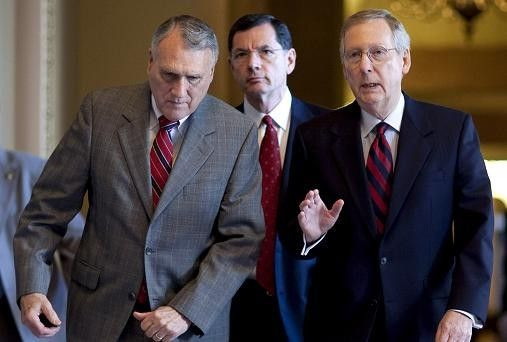Senate Conservatives Won't Try to Delay Debt Deal Bill's Consideration
Analysis

Congressional Democrats and Republicans moved a step closer to a bipartisan, $2.8 trillion debt reduction deal Sunday that would avert a potentially catastrophic U.S. Government default, when key Senate conservative Tea Party legislators said they will not try to delay a vote on the debt deal via parliamentary tactics.
If any Senator withholds his or her consent to speed the chamber's proceeding, Senate Majority Leader Harry Reid, D-Nev., cannot pass legislation to raise the debt ceiling before Wednesday, a Senate aide told thehill.com Sunday.
Also on Sunday, aides to Reid said he would back the bipartisan bill if his Democratic caucus approves of it.
Congress needs to raise the debt ceiling by Tuesday, Aug. 2, when the federal government both runs out of money and loses the authority to borrow more money. A failure to do so would likely further upset already-concerned stock, bond, and currency markets, hence the Tea Party "no delay" stance points to a Monday Senate vote on the now likely bipartisan bill to emerge from the Democratic/Republican negotiations.
No Reason to Try to 'Run the Clock Out'
Tea Party member U.S. Sen. Mike Lee, R-Utah, said he would insist that any bipartisan bill receive at least 60 votes on the Senate floor, but he would not drag out the process to delay any agreement beyond Tuesday.
"I don't see any reason for not agreeing to an advanced time table," Lee said, thehill.com reported Sunday. "A 60-vote threshold is one thing but there's no reason to run the clock out any more."
The Tea Party's stance in the Senate, if it holds, essentially means that all the bipartisan bill has to achieve is 60 votes -- there will be no procedural hurdles to delay it. To be sure, getting 60 votes in the Senate is not a modest feat, but given the magnitude of the legislation Senate leaders are unlikely to present a bill that doesn't have 60 votes.
Senate Minority Leader Mitch McConnell, R-Ky., was optimistic Sunday but warned against premature celebrating.
"We're really, really close to an agreement," said McConnell, who is playing a key role in the negotiations on a plan to reduce the deficit and permit a vote to raise the debt ceiling.
The emerging bipartisan debt deal includes a two-step process to cut the deficit by about $2.8 trillion over a decade.
Lawmakers have already largely agreed on caps to annual discretionary spending over 10 years. Officials from both parties say that would save $1 trillion, while the nonpartisan Congressional Budget Office puts the figure at $750 billion.
Another $1.8 trillion would be identified by a special, 12-member, committee -- six Democrats, six Republicans -- appointed by Congress. The bill is expected to have automatic "trigger cutbacks" -- including cuts to popular Medicare and U.S. Department of Defense programs -- if the committee did not undertake the additional "heavy lifting" to enact the second-stage cuts.
The rationale for the "trigger cutbacks" argues that the 12-member committee is much more likely to make the cuts if the alternative is deep cuts to preferred programs: Medicare, in the case of the Democrats; Pentagon defense contracts, in the case of the Republicans.
Further, as of Sunday afternoon, the proposed bipartisan debt deal did not contain a tax increase or tax reform that would result in higher federal revenue.
Lawmakers: One Eye On Markets?
What's more, to say that Congressional negotiators may have been "nudged" to find common ground by the financial markets after weeks of bitter partisan rhetoric, would be an understatement.
There's an axiom in political science that argues "Congress doesn't react, unless not reacting will result in the wrath of the American voter."
In this case, it may have been "the wrath of the international financial markets" that provided the incentive to avert a U.S. Government default.
U.S. stock markets last week recorded their worst losses of the year, the dollar fell against the yen and Swiss franc, and institutional investors started to move large sums of money into insured bank accounts -- all tell-tale signs that a default would not please the markets.
Moreover, while no one can incontrovertibly say a U.S. default would freeze credit markets the way the Lehman Bros. collapse did, there was near-universal agreement in economics and Wall Street circles that a default would increase interest rates, and tighten credit, among other negative consequences. That's exactly what the barely-growing U.S. economy does not need now, and the default would have also slowed the global economy.
"If that were to happen [a U.S. default], it has consequences for every family and every business in this country (Britain) and all across the world," British treasury chief secretary Danny Alexander told the BBC.
In other words, more than any other factor, the markets -- and the interdependence of the global economy -- may have motivated Congressional Democrats and Republicans to find common ground.
Political/Public Policy Analysis: The Tea Party stance, if it holds, is huge: a bipartisan debt deal bill would face an up-or-down vote on its substance with no parliamentary delays -- a rare event these days in postmodern Washington.
But let's not get ahead of ourselves: the bill still has not been introduced. That said, on the positive tone coming out of the talks, and the Tea Party's stance, we're lowering the risk barometer, on a scale of 0 to 100 percent, of the likelihood of a U.S. Government default, to 20 percent on Sunday afternoon, 5 percentage points lower than Sunday at mid-day.
© Copyright IBTimes 2024. All rights reserved.





















